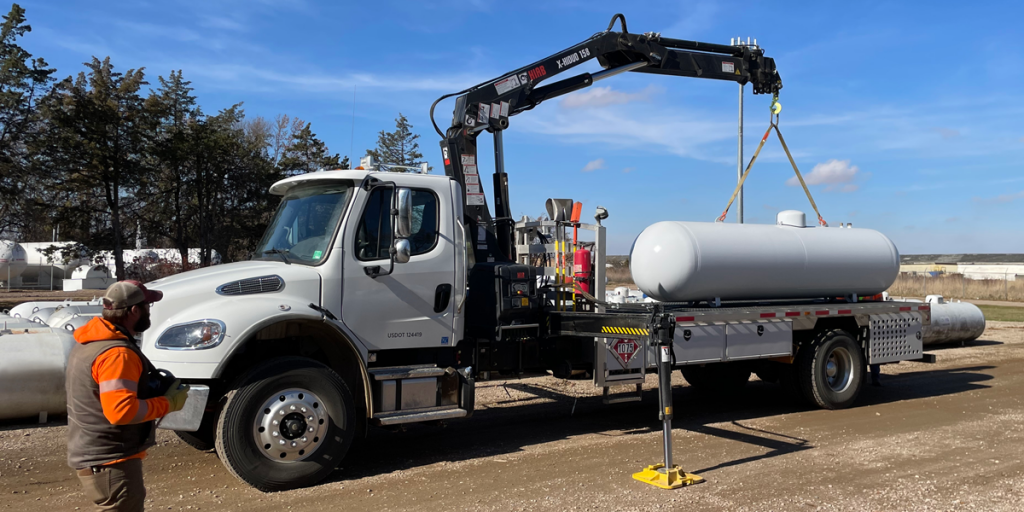
Equipment sourcing challenges of the past three years have started to improve for many things, but the supply chain for propane storage and transportation equipment still has some serious kinks in it.
The good news is that, for those looking to replace or expand propane storage tanks, waiting times and pricing have stabilized this past year, says Kenton Sonnenburg, CHS Propane energy equipment manager. “In 2021, when global supply chains were seriously impacted by the pandemic, we saw tank availability stretch from having something on hand to waiting four to six months for tank delivery. Prices jumped as much as 20 percent due mainly to the increased price of steel.
“Over the past year, the average wait for tanks to be built has been 16 to 20 weeks, then another few weeks for delivery. Installation usually takes about one week, if the installer has been lined up well ahead of time, and if all the parts are there,” he adds. “Sometimes there can be delays in installation if a pump or control valve is delayed. All those things come from different manufacturers, located all over the world. Waiting for a $200 fitting can hold up installation of a $150,000 system.”
Labor shortages have also slowed installation in some areas, he adds. “Some contractors are dealing with the same challenges seen in other industries of finding and keeping employees on their crews.”
Planning ahead is the best way to avoid many of these delays, says Sonnenburg. “If your business is hoping to add tank storage, now is a good time of year to start planning for a summer installation. “To work around delays, CHS has tried to have some of the most commonly used tank sizes in inventory, but we tell customers to plan five months ahead. This also allows enough time to get on an installer’s schedule and obtain the necessary permits.”
Making expansion affordable
Retailers don’t have to shoulder all the burden of expansion costs upfront. The CHS Storage for Pennies program provides a lease-to-own option on new bulk fuel storage and equipment, says Sonnenburg. “We can help customers choose the equipment and features that best fit their operation.
“We get quotes on that equipment and can help them figure out if overall cost is cheaper to get one large tank or two or three smaller ones,” he says. “We can source all the equipment and even line up the installation using reliable vendors.”
CHS coordinates financing through a third-party source and the annual lease payment is conveniently divided and included in the price of propane purchased from CHS – only fractions of a cent per gallon. “Most customers pay off their tanks in five to ten years,” says Sonnenburg.
Learn more about the CHS Storage for Pennies program.
The wait for new trucks
If your business is in the market for a new truck or, the supply picture is a bit bleaker. “Demand continues to outpace supply, by a lot, and the current outlook is for only gradual improvement in the next few years,” says Andrew Manchester, account manager for CHS Energy Equipment.
“Prior to the pandemic, we would typically source 150 to 200 trucks in a year,” he says. “The last few years manufacturers have been allocating new trucks and last year we received only 23. This year the number was slightly lower. You can’t even order a chassis, alone, anymore.”
Computer chips are still a limiting factor that most truck makers point to, but there have been delays with other parts, as well, he says. “Many companies also say they’re still facing labor challenges, and some don’t have enough skilled workers to be operating their plants at full capacity.”
Dealers don’t have any trucks on their lots that aren’t already spoken for, says Manchester. “If you can order a single-axle truck, you’ll most likely be waiting 10 to 11 months before you can take delivery. Prices have gone up 20 to 25% over the last two years, and when you sign an order, the price quote usually now stipulates that the price could increase up to 3% before delivery. If price increases are greater than 3%, the company will requote the truck price.”
As a result, the used truck market has gone crazy, he notes. “I’ve heard of used vehicles selling for close to new prices, just because businesses need them so badly. If a truck is damaged in an accident or needs major repairs, a company has no other options.
Manchester recommends businesses plan for truck replacements at least a year ahead and let your CHS account manager know what those specific needs are. “We coordinate fleet needs with our propane accounts so that we can try to negotiate bulk buys with certain truck makers to help keep costs down.”
Propane marketers should work with their CHS account managers for help in determining if they need additional propane storage or are looking to replace trucks or expand their fleet.
